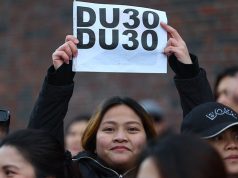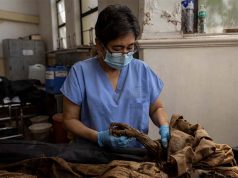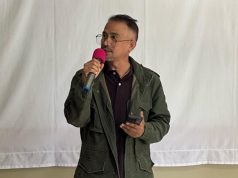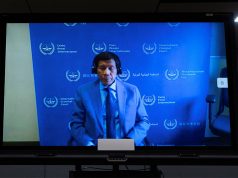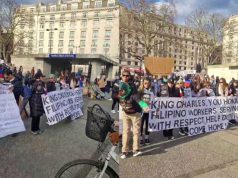
(UPDATED 3:00 p.m.) MANILA, Philippines – Destroying the “scourge of illegal drugs” and the importance of “non-interference in the internal affairs” of countries weighed heavy in President Rodrigo Duterte’s welcome of his fellow Association of Southeast Asian Nations leaders at the opening of their summit Saturday morning.
Duterte warned the ASEAN leaders that drugs posed a threat to their task of “community building” as he recounted seeing “how illegal drugs ended the dreams, hopes and lives of countless people, especially the youth.”
And in what sounded like an attempt to enlist his fellow heads of state in the war on drugs, Duterte, while acknowledging the illegal drug apparatus is “massive,” stressed it is “not impregnable” and “with political will and cooperation, it can be dismantled, it can be destroyed before it destroys our societies.”
Duterte has been waging an aggressive campaign against narcotics that has claimed thousands of lives since he came to power last year and earned him intense criticism here and abroad. However, he has lashed back at his critics, including the media, foreign leaders and international bodies such as the United Nations, with invective-laden rants and vowed more deaths until drugs are wiped out.
He also stressed the need to collectively address terrorism and other security concerns such as piracy by “advancing cooperation at the bilateral, regional, and multilateral levels.”
While stressing the importance of adhering to ASEAN’s “cornerstone values” of “mutual respect for independence, sovereignty, equality, territorial integrity and national identity of all nations and non-interference in the internal affairs of one another,” Duterte made no mention at all of the territorial rows in the South China Sea that involve the Philippines, other ASEAN members and China.
Earlier, Duterte said the statement issued by the summit would not touch on the favorable ruling by an international tribunal on the dispute between the Philippines and China.
In his speech Saturday, he did highlight the importance of “peaceful resolution of disputes (and) adherence to the supremacy of laws” and mutual respect as he stressed that relations among ASEAN members “can be made more productive and constructive if the values and principle of non-interference” are observed.
On the economic front, he urged the ASEAN nations to advance cooperation in the region and strengthen the processes of “integration, innovation, inclusivity and connectivity.”
“We must narrow the development gap to ensure that ASEAN citizens do not fall into the quagmire of poverty,” he said.
Duterte also thanked the country’s neighbors for their assistance in times of natural calamities and vowed that “the Philippines will do its own part to those in need in the region and beyond.”
Duterte and partner Honeylet Avancenia welcomed the ASEAN leaders and their spouses at the PICC hall.
After delivering the opening statement, he presided over the heads of states’ closed-door meeting, where they are expected to discuss a wide range of issues, including the final version of the ASEAN Declaration.
Avancena, on the other hand, will lead the spouses in a tour of the National Museum.
This is the first of two ASEAN Summits the country will host this year, which marks the regional bloc’s 50th anniversary.
The Southeast Asian leaders will be discussing the implementation of the ASEAN Community Vision 2025 and the way forward, external relations and future directions, and also exchange views on regional and international issues.
They are expected to sign the ASEAN Declaration on the Roles of the Civil Service as a Catalyst for Achieving the ASEAN Community Vision 2025.
ASEAN was established in Bangkok, Thailand on August 8, 1967 when the five founding members –Indonesia, Malaysia, the Philippines, Singapore and Thailand — signed the ASEAN Declaration.
Since then, it has expanded its membership to include Brunei Darussalam, Cambodia, Lao PDR, Myanmar and Viet Nam.
The ten member-states established the ASEAN Community in December 2015 with the goal of bringing more opportunities and benefits to the peoples in the region.
Click and watch the speech of President Duterte below:
READ THE FULL TEXT OF PRESIDENT DUTERTE’S OPENING STATEMENT:
Your Majesty, ASEAN Heads of State and Government, Secretary General of ASEAN, Former President Gloria Macapagal-Arroyo, Distinguished Guests, Ladies and Gentlemen,
I am honored to welcome you all to Manila for the 30th ASEAN Summit. The Philippines is privileged to chair the ASEAN on its milestone year – the 50th anniversary of the establishment of the regional association.
On this auspicious occasion, I stand before you humbled and proud to be in the company of friends, brothers, and sisters in the ASEAN.
We commemorate this momentous event with those who share ASEAN’s collective dreams and aspirations, as well as its struggles and challenges.
On August 8, 1967, the Founding Fathers of ASEAN laid the foundation of an organization anchored on the importance of unity, solidarity, and cooperation.
The cornerstones form part of time-honored principles of international law: Mutual respect for the independence, sovereignty, equality, territorial integrity, and national identity of all nations and non-interference in the internal affairs of one another.
As visionaries, our Founding Fathers underscored the value of cultivating and nurturing special bond of friendship despite our diversities as nations and peoples.
Envisioned to be relevant and dynamic, ASEAN has made collective achievements and breakthroughs amid momentary setbacks and disagreements.
Guided by our Chairmanship theme — Partnering for Change, Engaging the World –we are drawn today to reaffirm our aspiration for an ASEAN that works to effect positive change in the lives of our peoples. An Association that is proactive, relevant and transformative.
Ten months into my Presidency, I had the privilege of meeting the Leaders of ASEAN Member States.
My visits were opportunities to discuss common issues and concerns at the bilateral level. They were also occasions to hold open and candid exchanges on shared interests for our region.
From those valued interactions we identified core priorities of the Philippines’ Chairmanship: building a people-oriented and people-centered ASEAN, maintaining a peaceful and stable region, cooperating in maritime security, advancing inclusive and innovative-[led] growth, promoting ASEAN’s resiliency, and promoting ASEAN as a model for regionalism and as a global player.
I am heartened that you share and support our vision and our objectives.
The peoples of ASEAN share universal aspirations — that their rights and welfare as a people are protected and promoted.
Our peoples want a stable source of livelihood, a roof over one’s head, quality education for their children, affordable healthcare, a peaceful and stable government, and a dynamic economy.
These are indexes of prosperity. These uplift and dignify the human person. Today I say our peoples deserve these. And more.
After all, our peoples are at the heart of the community-building. We must do our best to achieve all of these. For them.
Our peoples are some of the hardest working you will find anywhere, willing to endure great sacrifices to give their families an opportunity to improve their lives.
Whenever I am abroad, I make it a point to meet our overseas Filipinos to hear their stories and make them feel that their President and their government genuinely care for them. My fellow Leaders in ASEAN no doubt can you relate to my story.
But migrants, along with other vulnerable sectors of society, need our support. As we continue to build an ASEAN Community that is rules-based, people-centered and people-oriented, we have the opportunity to do our part in addressing these concerns.
On the political and security front, we find that traditional and non-traditional security issues test our resolve to promote peace, stability, security and prosperity in our region.
Geopolitical and strategic developments around the globe also pose a challenge to our shared interests and goals, if not the security of our environment.
We must also be resolute in realizing a drug-free ASEAN. The scourge of illegal drugs threatens our gains in community-building.
I have seen how illegal drugs have ended the hopes, dreams, future and even lives of countless people, especially the youth.
The illegal drug trade apparatus is massive. But it is not impregnable. With political will and cooperation, it can be dismantled, it can be destroyed before it destroys our societies.
Equally important, we must not waver in our efforts to eliminate security threats to regional growth and development.
Piracy and armed robbery against ships disrupt the stability of regional and global commerce. Terrorism and violent extremism have brought the reality of attacks right on our shores and at our doorsteps.
Eternal vigilance is the price that we must pay to keep our citizens safe. We can only achieve this through advancing cooperation at the bilateral, regional, and multilateral levels.
On the economic front, we should take advantage of our partnership with the business community. We can advance cooperation in our region by staying true, steadfast, and resolute to our processes of integration, innovation, inclusivity, and connectivity.
We must build the capacities of our micro, small, and medium enterprises as engines of growth to realize this goal.
We also need to nurture sub-regional cooperation in order to bring progress to those who deserve it the most — those who have the very least in our societies.
These are but a few ways to narrow the development gap and to ensure that a person — The ASEAN Citizen — does not fall into the quagmire of poverty.
We must continue to work with our economic partners if we are to succeed in integrating our region into the global economy.
To be sure, there are rules to be played in international economic relations. Indeed, rules exist to be followed. But when we open ourselves to probing the basis and rationale, we also open the possibility of new approaches and perhaps a better regime.
Our region is one of the most vulnerable when it comes to natural disasters. The Philippines has borne the brunt of nature’s force. In 2013, Typhoon Haiyan turned some provinces and cities into wastelands. Thousands of lives were lost.
Amid the desolation and destruction, I saw the resilience of our people. They picked up the pieces of their lives and had the strong will to start over again. This is indomitable spirit of the Filipino people. This allows us to surpass challenges that come our way. This is also why are we focused on becoming more prepared to address these challenges.
The Philippines will never forget the timely assistance from fellow ASEAN countries. During our time of greatest need, you were there. We are eternally grateful. Today, I say the Philippines will do its own part to help those who are in need in our region and beyond.
This year, we are commemorating milestones with four of our dialogue partners — the 40th anniversary of dialogue relations with Canada, the European [Union], and the United States of America, and the 25th anniversary of relations with India. We are also commemorating the 20th anniversary of the ASEAN Plus Three.
These are relations that are valued. But they can be much more valuable and stronger if we learn to respect each other’s independence and treat each other as sovereign equals.
Our engagement with Dialogue Partners allowed us to set the table for meaningful discussions on maintaining peace and stability, the pursuit of development goals, the peaceful resolution of disputes, and the promotion of our peoples’ welfare. Let me say again, relations bear fruit when they are based on mutual respect and benefit. Dialogue relations can be made more productive and constructive if the valued principle of non-interference in the internal affairs of ASEAN Member States is observed.
Relations also remain solid if all stakeholders learn to respect and value the peaceful resolution of disputes. In an era where there can be much uncertainty, we must faithfully adhere to the supremacy of the law and rely on the primacy of rules as responsible members of the international community.
Your Majesty, Excellencies, ASEAN is about to reach 50 years. We are all witness to how cooperation, unity, and solidarity have changed the course of the history of our region.
It is incumbent upon us to be steadfast in upholding what are noble and true, as envisioned by the Founding Fathers of ASEAN.
History will judge us on how we are able to help our people and our region become [even] better and stronger based on the values and heritage we hold dear. In this milestone year, the time is ripe — and indeed it is right — to make our decisions [count]. It is time for ASEAN to finally assert, with conviction, its position in the international arena.
Let us remember: ASEAN has a compelling narrative of positive change [that] we can hold up to the world. Through our distinct ASEAN way, our region — with all its promise — stands at the center of the future of the Asia-Pacific region.
Let us with brave hearts and firm mind resolve to do all we can to make all our aspirations a reality. [This] will be the lasting legacy of ASEAN not just for our peoples but for the whole world.
On that note, Your Majesty, Excellencies, I now declare the 30th ASEAN Summit open.
Thank you.





